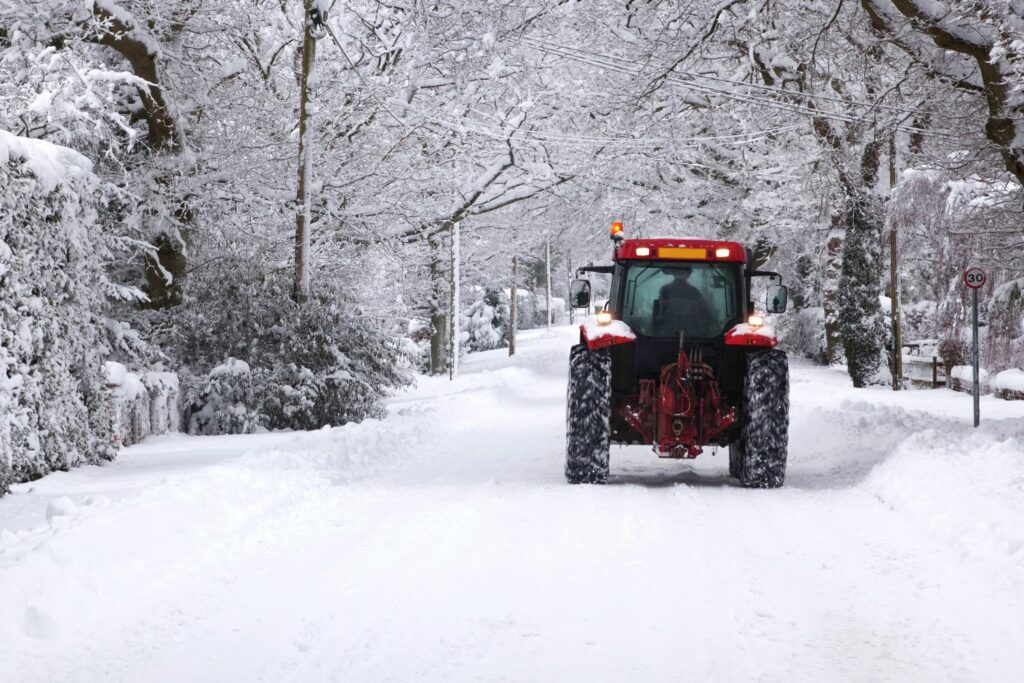Top tips for keeping your tractor running this winter
20th January 2023
While winter is generally a quiet time for farmers, there are still chores to be attended throughout the season. An important task to keep on top of is maintaining your

While winter is generally a quiet time for farmers, there are still chores to be attended throughout the season. An important task to keep on top of is maintaining your machinery in good condition so it is ready for work in the spring.
Whether you’re planning to lock your tractor away or keep using it over winter, there are a few things to keep in mind. Taking proper care of your tractor is an investment well spent and will not only extend the life of your machine, but will also keep its resale value in better shape.
Follow these tips to keep your tractor in mint condition in the off-season:
1. Schedule routine maintenance checks
It’s time to dust off your operator’s manual and get to know your machine better. The manual contains detailed information about maintenance specific to your tractor and also instructions on how to carry out a variety of checks and repairs. You will also find codes for the types of engine oil, coolant, brake fluid and other liquids your tractor uses.
Regardless of season, routine maintenance should always include inspecting tire pressures, fluids, hoses and fuel. Getting into the habit of conducting basic checks will go a long way towards exposing issues early and keeping repair costs at a minimum.
During the winter, remember to:
- Change your tractor’s oil before the cold weather sets in. Old oil will be more difficult to change in the spring as any sediment that accumulates over time will solidify when temperatures drop
- Consider using special winter oil if the weather gets particularly cold. Oil tends to thicken in lower temperatures, meaning your engine will take longer to warm up
- Clean or replace your air filters to prevent clogging in the spring
- Inspect rubber parts as the cold can make rubber brittle and more prone to tears. Watch out for warning signs like cracks or leaks and don’t hesitate to schedule a visit to your local garage if needed.
2. Winter-proof your fuel
When the temperature hits zero degrees Celsius, the paraffin in diesel begins to stiffen, which will reduce the efficiency of your engine. To keep your fuel fresh and your tractor performing at its best, use winter-grade fuel or add a conditioner or stabiliser to your tank.
When using a fuel conditioner, choose one that’s recommended for your machine by the manufacturer. Keep in mind the amount you’ll need will depend on how much fuel is sitting in your tank.
3. Give your engine time to warm up
Even if you’re using winter-grade fuel and oil, the engine and its components will work better when they are above 40 degrees Celsius. Letting your engine run for five to ten minutes before putting it to work is a great way to reduce wear and tear and preserve its lifespan.
4. Keep your tractor clean and free of grime
It may sound like a no-brainer, but giving your tractor a regular clean is one of the easiest ways to keep it in good condition. A pressure washer will get rid of heavy-duty mud and dirt quickly and effectively and help avert any potential performance issues.
Pay particular attention to the undercarriage and remove any salt your tractor might have picked up from the roads. Failing to do so will inevitably cause issues with rust and before you know it, an avalanche of repair bills will be hurtling your way.
Finally, beware that pressure washing can remove grease that is vital to the healthy functioning of your tractor. Therefore, once your machine is clean and dry, make sure you check all the grease points and reapply any grease that may have been removed.
5. Pay a visit to your local dealership
Especially if your tractor is racking up the engine hours, winter is a good time to pay a visit to your local garage. It will not only pinch issues in the bud and keep your tractor running at optimum performance, but will also give you peace of mind that your machine will not let you down in the year ahead.
Preparing your tractor for storage
If you’re planning to store your tractor over the winter, it’s essential that you take the necessary steps to prepare your machine. Tractors that are driven into a cold dark warehouse and forgotten about will emerge in much worse shape in the spring which will hinder your productivity.
Therefore, before sending your tractor into full hibernation, don’t forget to:
- Inflate tires to the correct air pressure following your operator’s manual. Remember that cold air compresses and may end up deforming or leaving your tire flat if pressure is lacking
- Disconnect or remove batteries before long-term storage as they will drain over time and will suffer permanent damage from the cold weather once empty. Alternatively, you can engage a battery maintainer which will preserve your unit until the next time you need it
- Give your machine a thorough check and reapply paint to areas prone to rust. This is an effective way of preventing deterioration of the metal, especially if the tractor is stored in a cold and damp place
- Remove any detachable monitors, devices and GPS equipment and store them in a warm and dry place. Cold and damp conditions can damage circuit boards and technology, plus a tractor devoid of tech is also less valuable to criminals
- Deep clean your tractor before placing it in long-term storage. Removing dirt and debris will help keep rust at bay and reduce the strain of winter
- If possible, park your tractor in a heated or insulated garage to protect it from the elements. You can also use an engine block heater to reduce the effects of cold weather and minimise warm-up time when your tractor is in use
- Ideally, store your tractor in a locked garage close to the house to deter criminals. If your area is a hotspot for tractor theft, install CCTV and equip your vehicle with security devices to help recover it in case it gets stolen.
Once your tractor has gone into storage, there are a few things that will need keeping an eye on to ensure your machine is ready to roll in the spring. It’s important to check the fluids every now and again, especially hydraulic fluid which can draw moisture in via condensation.
Make sure you also check your engine compartment regularly, as the moisture in the air can cause shorts or the failure to spark. In addition, look inside your cabin and wipe down any mould that may have formed because of the damp.
Lastly, fuel that sits for a long time can also cause issues, so don’t forget to fire your tractor up every three weeks or so to prevent any spoiling.


